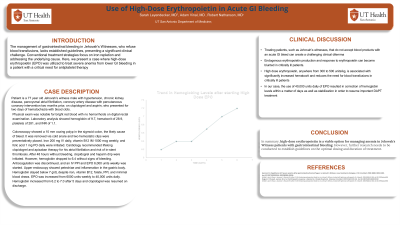Tuesday Poster Session
Category: GI Bleeding
P4242 - Use of High-Dose Erythropoietin in Acute GI Bleeding
Tuesday, October 29, 2024
10:30 AM - 4:00 PM ET
Location: Exhibit Hall E

Has Audio
- SL
Sarah Leyendecker, MD
University of Texas Health San Antonio
San Antonio, TX
Presenting Author(s)
Sarah Leyendecker, MD1, Adam Vinall, MD2, Robert Nathanson, MD1
1University of Texas Health San Antonio, San Antonio, TX; 2University of Texas Health Science Center, San Antonio, TX
Introduction: The management of gastrointestinal bleeding in Jehovah's Witnesses, who refuse blood transfusions, lacks established guidelines, presenting a significant clinical challenge. Conventional treatment strategies focus on iron repletion and addressing the underlying cause. Here, we present a case where high-dose erythropoietin (EPO) was utilized to treat severe anemia from lower GI bleeding in a patient with a critical need for antiplatelet therapy.
Case Description/Methods: Patient is a 77 year old Jehovah’s witness male with hypertension, chronic kidney disease, paroxysmal atrial fibrillation, coronary artery disease with percutaneous coronary intervention two months prior, on clopidogrel and aspirin, who presented for two days of hematochezia with blood clots.
Vitals on admission were temperature of 37.0 C, blood pressure of 189/92, heart rate 72, respiratory rate 18, and saturating 96% on room air. Physical exam was notable for bright red blood with no hemorrhoids on digital rectal examination. Laboratory analysis showed hemoglobin of 9.7, hematocrit of 28.9, platelets of 281, and INR of 1.1.
Colonoscopy showed a 10 mm oozing polyp in the sigmoid colon, the likely cause of bleed. It was removed via cold snare and two hemostatic clips were preventatively placed. Iron 200 mg IV daily, vitamin B12 IM 1000 mcg weekly, and folic acid 1 mg PO daily were initiated. Cardiology recommended lifelong clopidogrel and apixaban therapy for his atrial fibrillation and risk of in-stent thrombosis. After 48 hours without bleeding, clopidogrel and heparin drip were initiated. However, hemoglobin dropped to 6.4 without signs of bleeding. Anticoagulation was discontinued, and an IV PPI and EPO 6,000 units weekly was started. Upper endoscopy showed petechiae and inflammation in the gastric body. Hemoglobin stayed below 7 g/dL despite iron, vitamin B12, folate, PPI, and minimal blood draws.
EPO was increased from 6000 units weekly to 40,000 units daily. Hemoglobin increased from 6.2 to 7.0 after 5 days and clopidogrel was resumed on discharge.
Discussion: This case highlights the use of high-dose EPO as a lifesaving alternative to blood transfusion. The successful increase in hemoglobin allowed for the continuation of necessary antiplatelet therapy, demonstrating the potential of erythropoietin in similar clinical scenarios. Ultimately, this underscores the need for further research and development of guidelines to optimize the management of gastrointestinal bleeding in Jehovah's Witness patients.
Disclosures:
Sarah Leyendecker, MD1, Adam Vinall, MD2, Robert Nathanson, MD1. P4242 - Use of High-Dose Erythropoietin in Acute GI Bleeding, ACG 2024 Annual Scientific Meeting Abstracts. Philadelphia, PA: American College of Gastroenterology.
1University of Texas Health San Antonio, San Antonio, TX; 2University of Texas Health Science Center, San Antonio, TX
Introduction: The management of gastrointestinal bleeding in Jehovah's Witnesses, who refuse blood transfusions, lacks established guidelines, presenting a significant clinical challenge. Conventional treatment strategies focus on iron repletion and addressing the underlying cause. Here, we present a case where high-dose erythropoietin (EPO) was utilized to treat severe anemia from lower GI bleeding in a patient with a critical need for antiplatelet therapy.
Case Description/Methods: Patient is a 77 year old Jehovah’s witness male with hypertension, chronic kidney disease, paroxysmal atrial fibrillation, coronary artery disease with percutaneous coronary intervention two months prior, on clopidogrel and aspirin, who presented for two days of hematochezia with blood clots.
Vitals on admission were temperature of 37.0 C, blood pressure of 189/92, heart rate 72, respiratory rate 18, and saturating 96% on room air. Physical exam was notable for bright red blood with no hemorrhoids on digital rectal examination. Laboratory analysis showed hemoglobin of 9.7, hematocrit of 28.9, platelets of 281, and INR of 1.1.
Colonoscopy showed a 10 mm oozing polyp in the sigmoid colon, the likely cause of bleed. It was removed via cold snare and two hemostatic clips were preventatively placed. Iron 200 mg IV daily, vitamin B12 IM 1000 mcg weekly, and folic acid 1 mg PO daily were initiated. Cardiology recommended lifelong clopidogrel and apixaban therapy for his atrial fibrillation and risk of in-stent thrombosis. After 48 hours without bleeding, clopidogrel and heparin drip were initiated. However, hemoglobin dropped to 6.4 without signs of bleeding. Anticoagulation was discontinued, and an IV PPI and EPO 6,000 units weekly was started. Upper endoscopy showed petechiae and inflammation in the gastric body. Hemoglobin stayed below 7 g/dL despite iron, vitamin B12, folate, PPI, and minimal blood draws.
EPO was increased from 6000 units weekly to 40,000 units daily. Hemoglobin increased from 6.2 to 7.0 after 5 days and clopidogrel was resumed on discharge.
Discussion: This case highlights the use of high-dose EPO as a lifesaving alternative to blood transfusion. The successful increase in hemoglobin allowed for the continuation of necessary antiplatelet therapy, demonstrating the potential of erythropoietin in similar clinical scenarios. Ultimately, this underscores the need for further research and development of guidelines to optimize the management of gastrointestinal bleeding in Jehovah's Witness patients.
Disclosures:
Sarah Leyendecker indicated no relevant financial relationships.
Adam Vinall indicated no relevant financial relationships.
Robert Nathanson indicated no relevant financial relationships.
Sarah Leyendecker, MD1, Adam Vinall, MD2, Robert Nathanson, MD1. P4242 - Use of High-Dose Erythropoietin in Acute GI Bleeding, ACG 2024 Annual Scientific Meeting Abstracts. Philadelphia, PA: American College of Gastroenterology.
